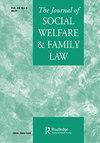A detrimental decision on ownership of the family home?
IF 0.6
Q2 LAW
引用次数: 1
Abstract
In Hudson v Hathway [2022] EWHC 631 (QB), Kerr J potentially made it easier for a cohabiting partner to claim a share greater than 50% in a jointly owned home. He held that in ‘joint names’ cases where there is no express declaration of trust but there is (at least) an express agreement about beneficial ownership such a partner need not prove that she acted to her detriment in reliance on a common intention to alter the initial presumption of joint beneficial ownership recognised by Stack v Dowden [2007] UKHL 17 and Jones v Kernott [2011] UKSC 53. The decision, however, will excite considerable doctrinal controversy. Mr Hudson and Ms Hathway became a couple in 1990 and went on to have two sons. They bought Picnic House in 2007, and both became registered proprietors but without an express declaration of trust. They never married, and Mr Hudson left the home in 2009 having formed a relationship with another woman. Ms Hathway and both sons remained living at Picnic House. Between 2007 and 2015, the mortgage on the property was paid from Mr Hudson and Ms Hathway’s joint account, albeit that in practice he contributed more because of a higher salary. The parties’ prospects of selling the property were severely blighted by an oil spill from a neighbouring property in 2011, whose consequences took years to resolve. Over 20 months, the parties discussed financial arrangements over email. In August 2013, Ms Hathway accepted an arrangement whereby Mr Hudson retained beneficial ownership of some shares and a pension, while she would have the equity in Picnic House, its contents, savings and income from endowments. She committed to readying the house for sale as soon as the oil spill issue was resolved. By mid 2014 Mr Hudson was becoming impatient with the lack of progress and referred to the time that had passed since the parties ‘reached a deal’. He stopped contributing to the mortgage in January 2015, and Ms Hathway assumed sole responsibility for it. It was not until October 2019 that Mr Hudson sought an order for sale of Picnic House under the Trusts of Land and Appointment of Trustees Act 1996, with equal division of the proceeds. Ms Hathway agreed to sale but argued that she was entitled to all of the sale proceeds on the basis of a common intention on which she had detrimentally relied. At first instance, Judge Ralton found a clear agreement that Ms Hathway was beneficially entitled to all of the equity in Picnic House. He analysed it in the context of a constructive trust: the possibility that an email exchange might satisfy section 53(1)(b) of the Law of Property Act 1925 and thus evidence an enforceable express trust by analogy with Neocleus v Rees [2019] EWHC 2462 (Ch) was not apparently considered. He对家庭房屋所有权的不利决定?
在Hudson v Hathway [2022] EWHC 631 (QB)中,Kerr J可能使同居伴侣更容易要求共同拥有的房屋中超过50%的份额。他认为,在“联名”案件中,如果没有明确的信托声明,但(至少)有关于受益所有权的明确协议,这样的合伙人不需要证明她的行为损害了她的利益,因为她依赖于Stack v Dowden [2007] UKHL 17和Jones v Kernott [2011] UKSC 53所承认的共同意图来改变共同受益所有权的初始假设。然而,这一决定将激起相当大的教义争议。哈德森和海瑟薇于1990年结为夫妻,并育有两个儿子。他们在2007年买下了野餐屋,两人都成为了注册业主,但都没有明确的信托声明。他们从未结婚,哈德森先生在2009年离开了家,与另一个女人建立了关系。海瑟薇和两个儿子仍然住在野餐屋。在2007年至2015年期间,该房产的抵押贷款是由哈德森和海瑟薇的联合账户支付的,尽管实际上他的贡献更多,因为他的工资更高。2011年,邻近的一处房产发生石油泄漏,导致双方出售这处房产的前景严重受损,其后果花了数年时间才得以解决。在20个月的时间里,双方通过电子邮件讨论了财务安排。2013年8月,海瑟薇接受了一项安排,根据该安排,哈德森保留了部分股票和养老金的实益所有权,而她将拥有野餐屋的股权、内容、储蓄和捐赠收入。她承诺一旦石油泄漏问题得到解决,就准备出售这所房子。到2014年年中,哈德森对缺乏进展感到不耐烦,他提到了各方“达成协议”以来已经过去的时间。2015年1月,他停止支付抵押贷款,海瑟薇承担了全部责任。直到2019年10月,哈德森先生才根据《1996年土地信托和受托人委任法》寻求出售野餐屋的命令,并平等分配收益。海瑟薇同意出售,但辩称,基于一个共同的意图,她有权获得全部出售所得,而她对这个共同的意图产生了不利的依赖。在一审中,法官Ralton发现一项明确的协议,即海瑟薇享有野餐屋的所有权益。他在建设性信托的背景下对其进行了分析:显然没有考虑电子邮件交换可能满足《1925年财产法》第53(1)(b)条的可能性,从而通过与Neocleus v Rees [2019] EWHC 2462 (Ch)的类推证明可执行的明示信托。他
本文章由计算机程序翻译,如有差异,请以英文原文为准。
求助全文
约1分钟内获得全文
求助全文
来源期刊
CiteScore
2.00
自引率
13.30%
发文量
52
期刊介绍:
The Journal of Social Welfare & Family Law is concerned with social and family law and policy in a UK, European and international context. The policy of the Editors and of the Editorial Board is to provide an interdisciplinary forum to which academics and professionals working in the social welfare and related fields may turn for guidance, comment and informed debate. Features: •Articles •Cases •European Section •Current Development •Ombudsman"s Section •Book Reviews

 求助内容:
求助内容: 应助结果提醒方式:
应助结果提醒方式:


